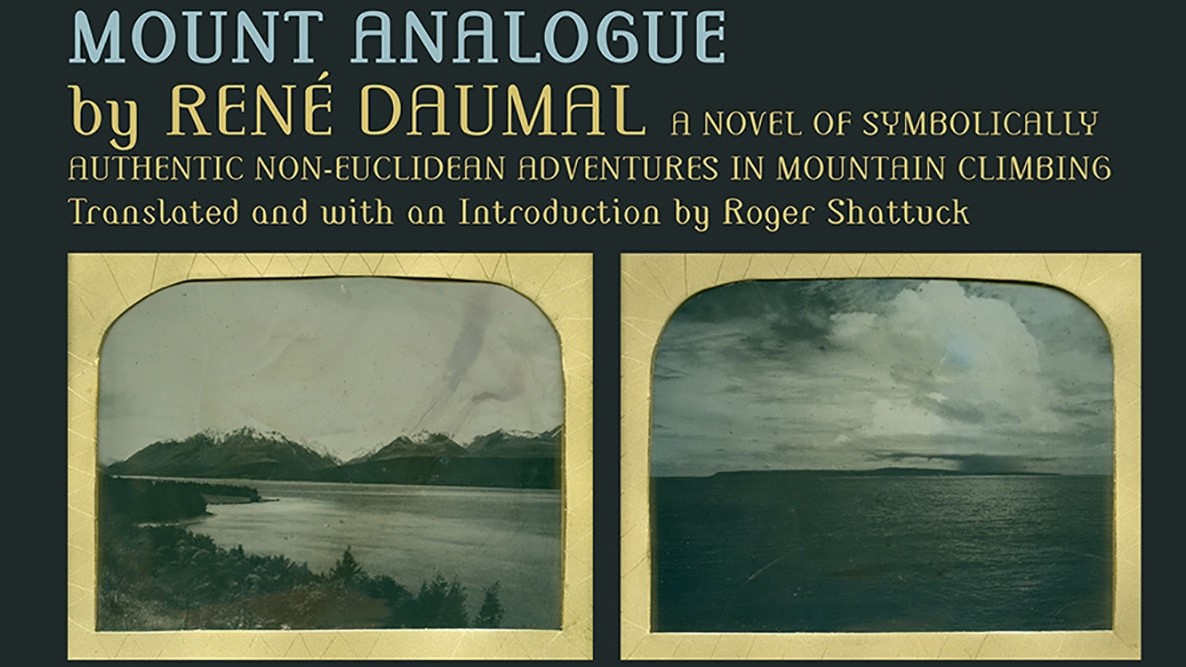Mount Analogue
H ere we bring to you a potent discussion on death and identity from Mount Analogue: A Novel of Symbolically Authentic Non-Euclidean Adventures in Mountain Climbing by René Daumal, described as follows:
In the passage below Father Sogol begins; the narrator replies.
‘With a little money in this galloping civilization of ours one can easily obtain the basic physical satisfactions. The rest is fraud. Fraud, ticks, and tricks — there's our whole life, from diaphragm to cranium. My Superior was right: I suffer from an incurable need to understand. I don't want to die without having understood why I lived. What about you? Have you ever been afraid of death?’
In silence I hunted around among my memories, deep memories where words had never before pried. And I spoke with difficulty. ‘Yes. When I was around six I heard something about flies which sting you when you're asleep. And naturally someone dragged in the old joke: “When you wake up you're dead.” The words haunted me. That evening in bed with the light out, I tried to picture death, the “no more of anything”. In my imagination I did away with all the outward circumstances of my life and felt myself confined in ever-tightening circles of anguish: there was no longer any “I” … What does it mean “I”? I couldn’t succeed in grasping it. “I” slipped out of my thoughts like a fish out of the hands of a blind man, and I couldn’t sleep. For three years these nights of questioning in the dark recurred fairly frequently. Then, on one particular night, a marvellous idea came to me: instead of just enduring this agony, try to observe it, to see where it comes from and what it is. I perceived that it all seemed to come from a tightening of something in my stomach, as well as under my ribs and in my throat. I remembered that I was subject to angina and forced myself to relax, especially my abdomen. The anguish disappeared. When I tried again in this new condition to think about death, instead of being clawed by anxiety, I was filled with an entirely new feeling. I knew no name for it — a feeling between mystery and hope.’
‘And then you grew up, went to school, and began to “philosophize”, didn't you? We all go through the same thing. It seems that during adolescence a person's inner life is suddenly weakened, stripped of its natural courage. In his thinking he no longer dares stand face to face with reality or mystery; he begins to see them through the opinions of “grown-ups”, through books and courses and professors. Still, a voice remains which is not completely muffled and which cries out every so often — every time its gag is loosened by an unexpected jolt in the routine. The voice cries out its great questioning of everything, but we stifle it again right away. Well, we already understand each other a little. I can admit to you that I fear death. Not what we imagine about death, for such fear is itself imaginary. And not my death as it will be set down with a date in the public records. But that death I suffer every moment, the death of that voice which, out of the depths of my childhood, keeps questioning me as it does you: “Who am I?” Everything in and around us seems to conspire to strangle it once and for all. Whenever the voice is silent — and it doesn’t speak often — I’m an empty body, a perambulating carcass. I’m afraid that one day it will fall silent forever, or that it will speak too late — as in your story about the flies: when you wake up, you’re dead.’
Did you feel that, too?

